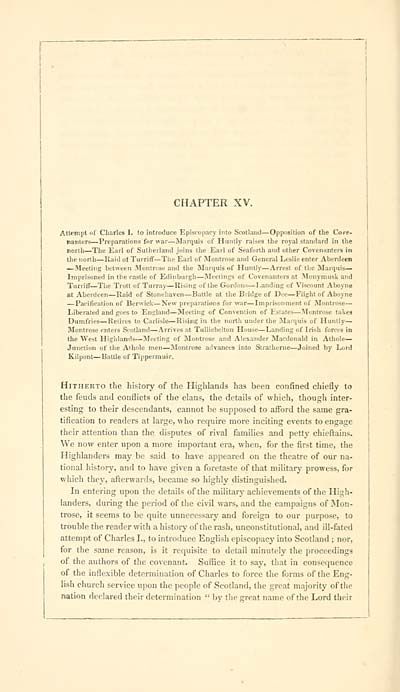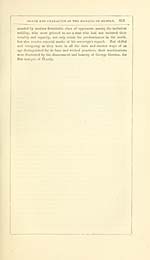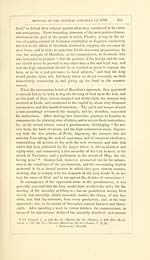Download files
Complete book:
Individual page:
Thumbnail gallery: Grid view | List view

CHAPTER XV.
Atlempt I'l" Charles 1. to introduce Episcopacy into Scotland — Opposition of the Cofe-
naiilers — Preparations fur war — Marquis of Huntly raises the royal standard in the
north — The Earl of Sutherland joins the Earl of Seafurth and other Covenanters in
the north — Raid ot Turriff — The Earl of Montrose and General Leslie enter Aberdeen
■ — .Meeting between IMonlrose and the Mai-quis of Huntlv* — Arrest of the Marquis^
Imprisoned in the castle of Edinburgh — Meetings of Co%'enanters at IVlonymusk and
Turritf— The Trott of Turray— Rising of the Gordons— l-anding of Viscount Aboyne
at Aberdeen — Raid of Stonehaven— Battle at the Bridge of Dee— Flight of Aboyne
— Pacification of Berwick — New preparations for war — Imprisonment of Montrose —
Liberated and goes to England — iVIeeting of Convention of Estates — IMontrose takes
Dumfries — Retires to Carlisle — Rising in the north under the JIarquis of Huntly —
Montrose enters Scotland — Arrives at Tulliebelton House — Landing of Irish forces in
the West Highlands — ^Meeting of Montrose and Alexander Macdonald in Athole —
Junction of the Atliole men — Montrose advances into Stratherne — Joined by Lord
Kilpont — Battle of Tippermuir.
Hitherto the Iiistory of the Highlands has been confined cliiefly to
the feuds and conflicts of the clans, the details of which, though inter-
esting to their descendants, cannot be supposed to afford the same gra-
tification to readers at large, who require more inciting events to engage
their attention than the disputes of rival families and petty chieftains.
We now enter upon a more important era, when, for the first time, the
Highlanders may be said to have appeared on the theatre of our na-
tional history, and to have given a foretaste of that militarj- prowess, for
which they, afterwards, became so highly distinguished.
In entering upon the details of the military achievements of the High-
landers, during the period of the civil wars, and the campaigns of Mon-
trose, it seems to be quite unnecessary and foreign to our purpose, to
trouble the reader with a history of the rash, unconstitutional, and ill-fated
attempt of Charles I., to introduce English episcopacy into Scotland ; nor,
for the same reason, is it requisite to detail minutely the proceedings
of the authors of the covenant. Suffice it to say, that in consequence
of the inflexible determination of Charles to force the forms of tlie Eng-
lish church service upon the people of Scotland, the great majority of tlie
nation declared their determination " I)y tlie great name of the Lord their
Atlempt I'l" Charles 1. to introduce Episcopacy into Scotland — Opposition of the Cofe-
naiilers — Preparations fur war — Marquis of Huntly raises the royal standard in the
north — The Earl of Sutherland joins the Earl of Seafurth and other Covenanters in
the north — Raid ot Turriff — The Earl of Montrose and General Leslie enter Aberdeen
■ — .Meeting between IMonlrose and the Mai-quis of Huntlv* — Arrest of the Marquis^
Imprisoned in the castle of Edinburgh — Meetings of Co%'enanters at IVlonymusk and
Turritf— The Trott of Turray— Rising of the Gordons— l-anding of Viscount Aboyne
at Aberdeen — Raid of Stonehaven— Battle at the Bridge of Dee— Flight of Aboyne
— Pacification of Berwick — New preparations for war — Imprisonment of Montrose —
Liberated and goes to England — iVIeeting of Convention of Estates — IMontrose takes
Dumfries — Retires to Carlisle — Rising in the north under the JIarquis of Huntly —
Montrose enters Scotland — Arrives at Tulliebelton House — Landing of Irish forces in
the West Highlands — ^Meeting of Montrose and Alexander Macdonald in Athole —
Junction of the Atliole men — Montrose advances into Stratherne — Joined by Lord
Kilpont — Battle of Tippermuir.
Hitherto the Iiistory of the Highlands has been confined cliiefly to
the feuds and conflicts of the clans, the details of which, though inter-
esting to their descendants, cannot be supposed to afford the same gra-
tification to readers at large, who require more inciting events to engage
their attention than the disputes of rival families and petty chieftains.
We now enter upon a more important era, when, for the first time, the
Highlanders may be said to have appeared on the theatre of our na-
tional history, and to have given a foretaste of that militarj- prowess, for
which they, afterwards, became so highly distinguished.
In entering upon the details of the military achievements of the High-
landers, during the period of the civil wars, and the campaigns of Mon-
trose, it seems to be quite unnecessary and foreign to our purpose, to
trouble the reader with a history of the rash, unconstitutional, and ill-fated
attempt of Charles I., to introduce English episcopacy into Scotland ; nor,
for the same reason, is it requisite to detail minutely the proceedings
of the authors of the covenant. Suffice it to say, that in consequence
of the inflexible determination of Charles to force the forms of tlie Eng-
lish church service upon the people of Scotland, the great majority of tlie
nation declared their determination " I)y tlie great name of the Lord their
Set display mode to: Large image | Transcription
Images and transcriptions on this page, including medium image downloads, may be used under the Creative Commons Attribution 4.0 International Licence unless otherwise stated. ![]()
| Early Gaelic Book Collections > Ossian Collection > History of the Highlands and of the Highland clans > Volume 1 > (428) |
|---|
| Permanent URL | https://digital.nls.uk/79677733 |
|---|
| Description | Vol. I. |
|---|---|
| Shelfmark | Oss.247 |
| Additional NLS resources: | |
| Attribution and copyright: |
|
| Description | Selected books from the Ossian Collection of 327 volumes, originally assembled by J. Norman Methven of Perth. Different editions and translations of James MacPherson's epic poem 'Ossian', some with a map of the 'Kingdom of Connor'. Also secondary material relating to Ossianic poetry and the Ossian controversy. |
|---|
| Description | Selected items from five 'Special and Named Printed Collections'. Includes books in Gaelic and other Celtic languages, works about the Gaels, their languages, literature, culture and history. |
|---|

